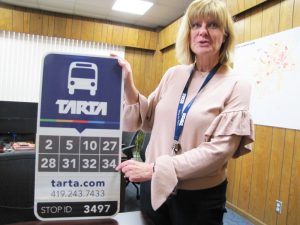
By Fletcher Word
Sojourner’s Truth Editor
In the November 2021 general election, the Toledo Area Regional Transit Authority (TARTA) finally received authorization from Lucas County voters to switch its local funding model from the outmoded property tax to a sales tax not only changing the funding stream but also increasing the amount of revenue TARTA can anticipate in upcoming years.
That increase in revenue, notes Laura Koprowski, TARTA CEO, will enable the transit system to expand services, to increase the quality of its services, to replace an aging fleet and thereby attract many more riders and thereby help Toledo become a more attractive location for businesses and individuals seeking to relocate to this area.
“Investments like this are an economic development vehicle,” says Koprowski. “Transit systems can be so compelling for businesses and talent who want to locate here.”
The passage of the sales tax levy, a .05 percent addition to the current tax, will bring in approximately $30 million, according to estimates, compared to the current $13 million the property tax brings to TARTA. Part of that increase in revenues is due to the fact that the service area will be expanded to all of Lucas County, instead of the restricted area in which property taxes have been collected up to now.
The sales tax started April 1 and the property tax levy ended January 1, although property owners will see the last property tax installment collected in July.
The success of the November 2021 TARTA ballot levy followed years of frustration as the transit system attempted to switch the local funding stream since revenues from property taxes had decreased by $6 million over the past several decades.
Four times, TARTA attempted to get the change before the voters only to be stymied by elected officials in suburban towns who would not let the initiative appear on the ballot. Per state law, that approval had to be unanimous. Finally, the state changed the unanimity requirement to a simple majority.
“We have opened doors,” says Koprowski explaining that the increased fares and service areas will open up opportunities for jobs, for education, for the improvement of work skills. “Transit is a great equalizer as well.”
What’s next is TARTA Next, a plan for the future that will expand and improve the transit experience for area riders. That vision includes redesigned bus services; expanded and easier service and the creation of mobility opportunities. The plans for the future have been guided by ongoing community input.
TARTA Next envisions improving and expanding service on several fronts. First, of course, there are the fixed routes, those routes that are “ideal for dense population areas,” says Koprowski. TARTA is looking at ways to improve such routes where they already exist and include fixed routes in densely populated areas not currently served, such as Springfield and Oregon.
Paratransit service will also be expanded to the fixed route bus services and the vehicles redesigned and replaced.
TARTA will be adding a microtransit plan – new curb-to-curb on demand service within less densely populated zones. Microtransit vehicles, which will be available much like Uber or Lyft, will connect riders to TATRA bus service.
New connecting points will be established where fixed route buses and intersect with microtransit vehicles and, finally, TARTA will be integrating transit services of multiple types – such as bike/car share, car pools and scooters to have comprehensive travel service throughout the service area.
This view of the future arrives at an interesting time for TARTA and the community at large as the more than two-year long pandemic appears to be waning. TARTA reacted to COVID-19 by maintaining a limited service as they adjusted to the limited demand, eliminating fares, requiring social distancing and masks.
“I’m really proud of the TARTA Board of Trustees,” says Koprowski. “They aligned with the staff recommendations and we remained fare free.”
TARTA also never lost a front-line employee to COVID, sha adds. “And as we brought back service, employees stayed with us.”
2022 appears to be a big year for TARTA and its riders – seven-day service was restored in March; in addition to the sales tax, there new federal grants coming to the tune of $16 million,;36 new vehicles will arrive (among them 12 new TARPS vehicles) and a technology boom is around the corner – software upgrades for real-rime data collection, automatic passenger counters, fareboxes.
TARTA riders, says Koprowski, will be experiencing a total upgrade in service. “Those who are transit dependent deserve a clean, dependable system,” she says.
